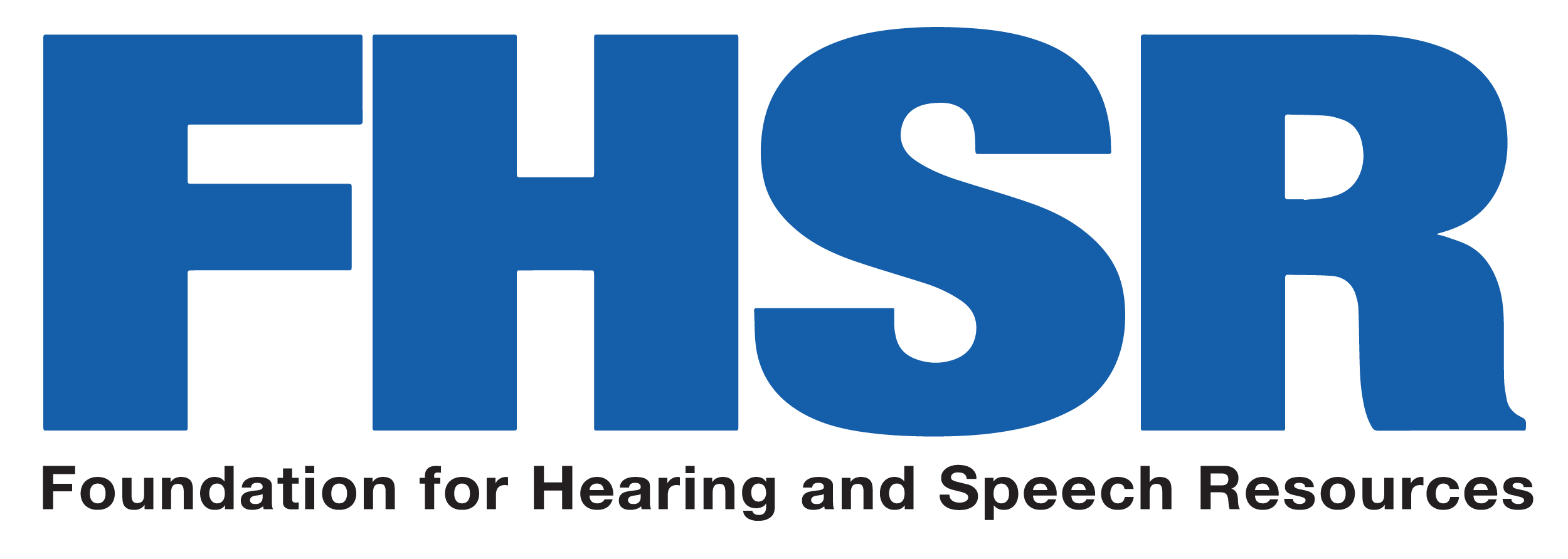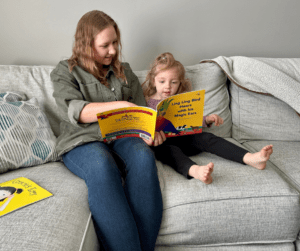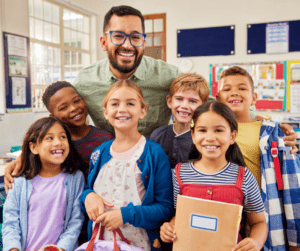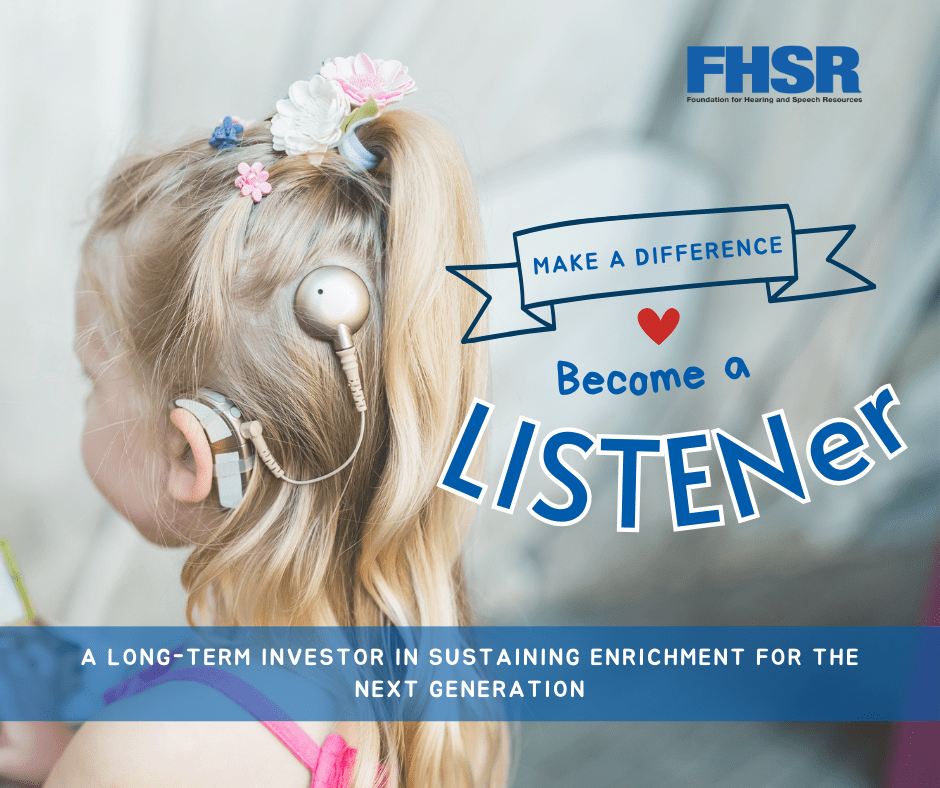2025 SPRING APPEAL FOR EDUCATION



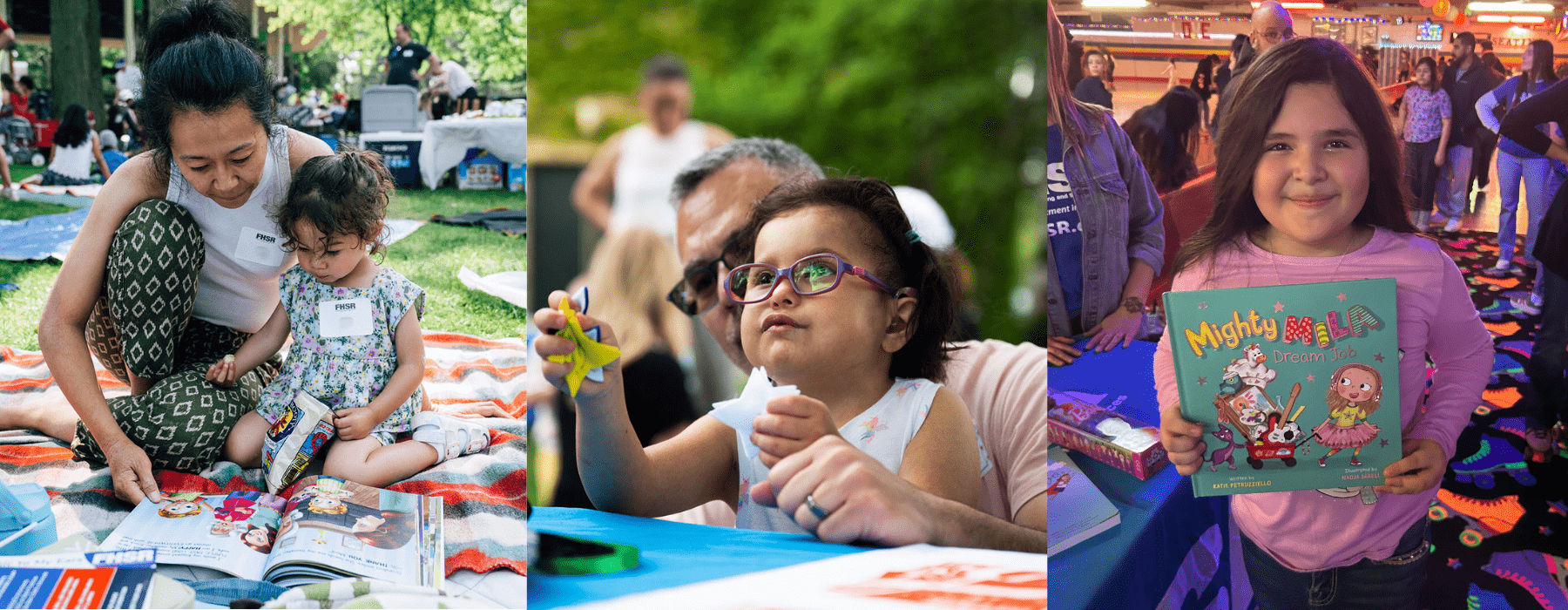
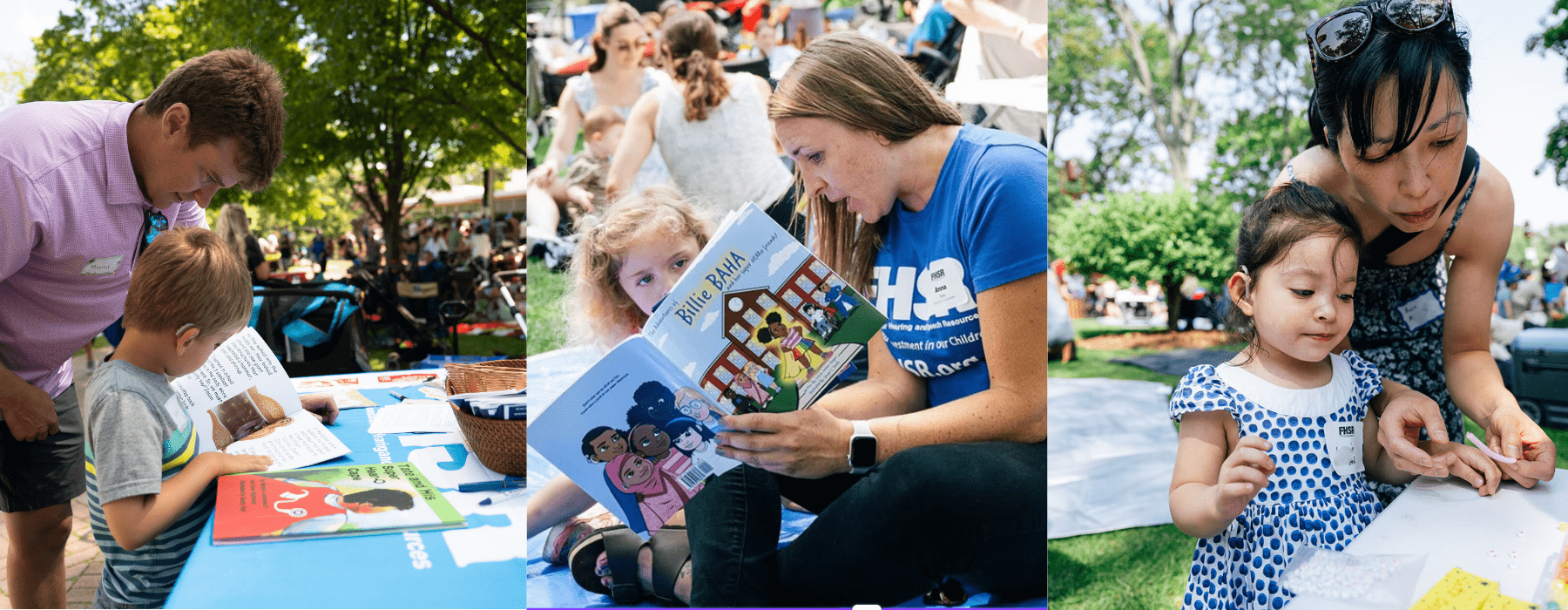
The FHSR Education Coordinator represents a long-held dream of FHSR’s staff and Board of Directors: a unique, personalized resource that partners with families living with pediatric hearing loss and the educators who serve them to help deaf and hard of hearing (DHH) students thrive in the classroom and beyond. 2025 is FHSR’s Year of Access & Inclusion, and our Education Coordinator, Dr. Anna Tess is working to provide inclusive services for children with hearing loss and additional disabilities.
Donate today to support the FHSR Education Coordinator, so FHSR can continue to help children
like Mary* and educators like Mr. Kelly.*
Your support keeps all of our programming and services free for the children, families and professionals who need them.
Want to donate through a DAF, make a gift of stock, or explore other giving options? Visit our Ways to Give page for more.
Mary*’s mother, Amanda, was devastated to learn of her daughter’s profound hearing loss, and again when she was diagnosed with dyslexia in the third grade. Thankfully, she was able to call on Dr. Anna Tess to help her create and modify an Individualized Education Plan (IEP) tailored to Mary’s unique needs in the classroom. With FHSR’s support, Mary is back on track to reading success.
Mr. Kelly* is a great teacher, who has a real heart for students with special needs. He teaches in a deaf and hard of hearing (DHH) classroom in an urban school. Mr. Kelly reached out to the FHSR Education Coordinator for help in making his classroom more accessible to students with hearing loss, but in consultation with Dr. Anna Tess determined that there were likely other issues at play. Dr. Tess helped him add additional accommodations and supports for students who are deaf with disabilities (DWD). Mr. Kelly’s classroom has been transformed – and, after he shared what Dr. Tess taught him with other teachers, and his whole school has benefited.
*Names and identifying information have been redacted to protect the privacy of all individuals involved.
Make a lasting impact for as little as $10 a month - become a LISTENer
FHSR relies on our LISTENers – Long-term Investors in Sustaining Enrichment for the Next generation – to provide ongoing funding so we can keep our programs and services free for the families and children who need them the most. Your recurring gift provides a steady rhythm of support that helps us plan ahead, expand our impact, and provide consistent support!
Mary's* Story
Like most children, Mary* passed her newborn hearing screening. But by her first birthday, her daycare providers were noticing that she didn’t seem to be hearing them. Over the course of her first year, Mary had developed profound hearing loss. She was successfully implanted with cochlear implants at 18 and 24 months, and Mary’s mom, Amanda*, breathed a sigh of relief.
That feeling of relief lasted until about the middle of Mary’s third grade. Amanda, a teacher herself, sometimes suspected something was wrong: Mary loved to be read to, but she hated to read on her own. But Amanda didn’t mind – at the end of the day, it was nice to snuggle into the couch with her sweet daughter and read a book together. Mary would figure it out; it was probably just her hearing loss interfering with her learning to read.
In third grade, students transition from “learning to read” to “reading to learn,” but Mary wasn’t keeping up with her class. Amanda finally gave in to her nagging suspicions, and took Mary to a neuropsychologist. After a battery of tests, the doctor confirmed Amanda’s fears: Mary was diagnosed with dyslexia.
Mary was already on an Individualized Education Plan (IEP) for her hearing loss, but now the IEP process was about to get much more complicated. Now that Mary was officially diagnosed as “DWD” – that is, deaf with disability – how could Amanda be sure that her daughter would be provided with the appropriate supports and accommodations so she could thrive in the classroom? And what even were those supports and accommodations?
Luckily, Amanda had already made contact with Dr. Anna Tess, FHSR’s Education Coordinator. Dr. Tess had been a tremendous help the year previous, when Mary moved to a new school and her teachers weren’t familiar with her needs. Amanda reached out to Dr. Tess to ask her for resources for her daughter’s IEP revisions. On a video conference, Dr. Tess said she remembered Mary from her previous work with Amanda, and asked for an update on her busy schedule, laughing with Amanda over her recent dance recital.
Then, the discussion got serious – how could Amanda make sure Mary’s new diagnosis was added to her IEP? What accommodations would best support Mary’s language development and reading? Dr. Tess also walked Amanda through the IEP redetermination process, and offered her advice both on what she could ask for and how to get her IEP team on board. It was a long call – Amanda has learned over the years that she is her daughter’s best advocate, and despite her school district’s best efforts, is often the default expert on hearing loss in meetings about Mary’s academic progress. Dr. Tess stayed on the call with Amanda until all of her questions were answered, and she felt that she had a clear plan to bring up her daughter’s issues with school administration.
As she clicked to end her video call, Amanda smiled. Although it wouldn’t be easy, she now knew what she needed to do to support Mary … and she knew that if she needed her, Dr. Tess was just a call or email away. Amanda closed her laptop and breathed a deep sigh of relief.
*Names and identifying information have been redacted to protect the privacy of all individuals involved.
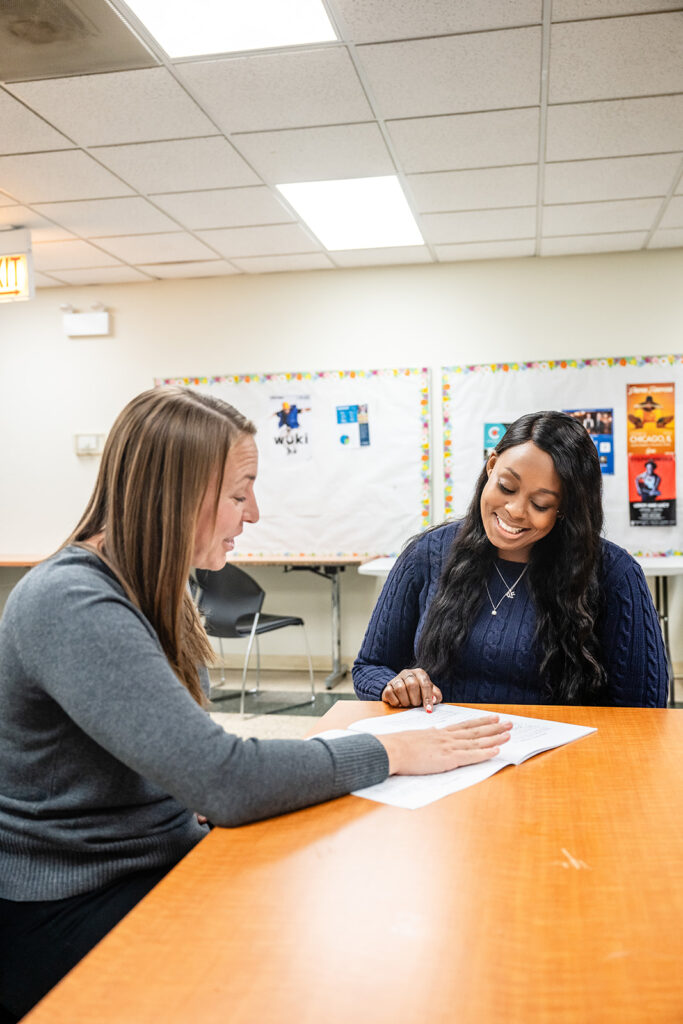
Donate today to support the Education Coordinator, so FHSR can continue to help children like Mary* and to keep all our programming and services free for the children and families who need them.
Mr. Kelly's* Story
Mr. Kelly* is a Teacher of the Deaf at a school in a city neighborhood. He has a classroom of six students this year, ranging in age from preschool to second grade. While the low student to teacher ratio usually means he can provide his students with the individualized support they need, his students also have a range of other disabilities in addition to their hearing loss – including autism and learning disabilities. There are a few kids who lack a formal diagnosis, but are showing all the signs of having other difficulties.
Last year, FHSR provided Mr. Kelly’s school with a set of cochlear implant batteries and chargers. Mr. Kelly was ecstatic – one kid in particular was always coming to school with his implant batteries dead, and missing out on most of the school day. Now, he could send this student to the audiologist immediately and have them rejoin the classroom with the ability to hear Mr. Kelly’s instructions.
Along with the equipment, Mr. Kelly’s school received information about FHSR’s Education Coordinator, Dr. Anna Tess. Although he’d been teaching deaf and hard of hearing (DHH) children for years, Mr. Kelly decided to reach out – he lives by the motto that an educator should always be a student, ready to learn as much as possible.
Dr. Tess’s conversations with Mr. Kelly began with hearing loss, but Dr. Tess soon suspected what Mr. Kelly knew: for some of his students, the hearing loss was compounded by additional issues, both diagnosed and undiagnosed. As Dr. Tess pointed out, with good amplification (shored up by FHSR’s donated equipment) and good education (provided by Mr. Kelly’s excellent instruction), his students shouldn’t be struggling as much as they were. Dr. Tess worked with Mr. Kelly to implement additional strategies to help his students regulate their bodies, focus, and learn: textured surfaces on their desks to fidget with, visual schedules to explain where they were in the school day, and simplified classroom decor to help easily distracted students stay on task.
With a few simple, no-cost changes to his classroom structure, Mr. Kelly saw immediate progress: fewer aberrant behaviors, more on-task learning, more engaged kids, and a happier teacher!
Over coffee in the teacher’s lounge, Mr. Kelly bragged about his fantastic students. Colleagues who were used to him complaining about the difficulties of herding six children with special needs were impressed – what was he doing differently? Soon, Mr. Kelly was sharing some of the strategies from Dr. Tess with other teachers in his school. Even teachers without DHH students or students with any special needs began applying what he had learned from Dr. Tess, and noticed that their students were more engaged and their classrooms calmer.
*Names and identifying information have been redacted to protect the privacy of all individuals involved.

Donate today to support the Education Coordinator, so FHSR can continue to help educators like Mr. Kelly* – and to keep all our programming and services free for the children and families who need them.
